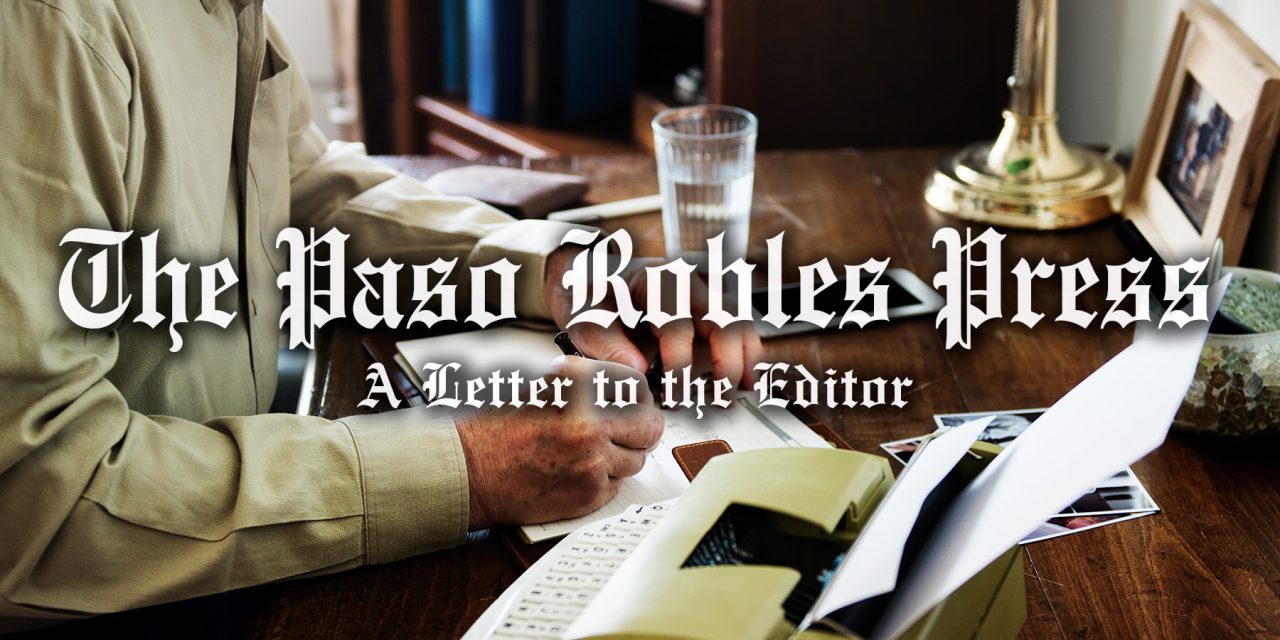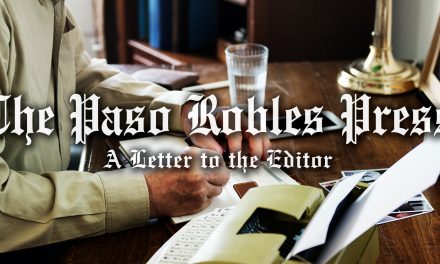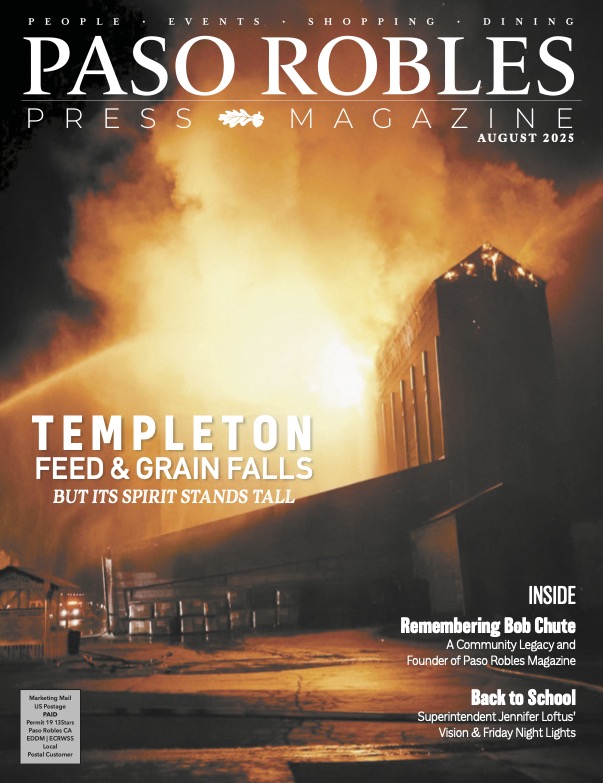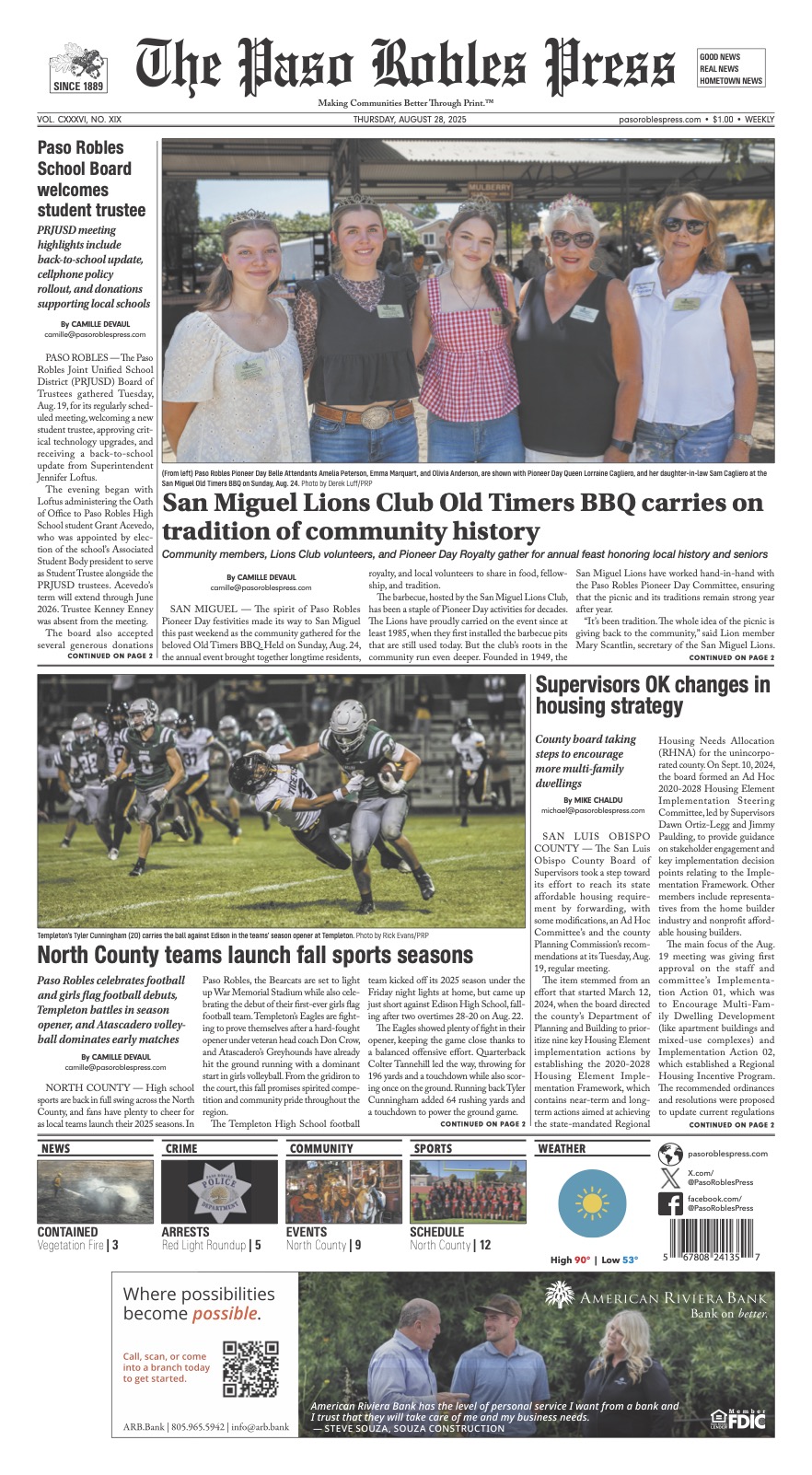Inclusion is Nothing to Fear
Dear Editor,
Put away the pitchforks. Take a deep breath. We understand why readers might be riled up and ready to rumble after Connie Pillsbury’s passionate but misinformed column about the lurking beast that is stalking our children. If we are to believe Pillsbury’s claims, the Marxists are taking over Paso Robles High School, and soon our students will be spewing venomous hate through our placid community.
The truth is much less dramatic and not scary at all. A single new elective class is being proposed that would offer our diverse students another space for learning about themselves and the world we live in. Over 51 percent of the school student body is students of color, who find themselves an integral part of the dynamic “city within a city” with an array of amazing communities and disciplines available to young Bearcats. From welding and journalism to drama and SkillsUSA, AP to athletics, Bearcats have wonderful opportunities. But it lacks a multicultural curriculum.
We welcome this important conversation about diversity in our high school, our community, and our nation. But let’s engage with civility as neighbors who want the best for our young people. Writing uninformed and alarmist columns is not helpful during this time of divisiveness, viral hate, and social media attacks. Pillsbury fears the course will “cause kids to hate their country and hate each other.”
This is far from the truth. The proposed Ethnic Studies at PRHS is about unity, inclusion, empathy, and exploration, not indoctrination and subversion. Please, Ms. Pillsbury. Drop the torch. Leave your unfounded fear to the side. Let’s talk. Pillsbury fails to understand that it’s possible to talk about economics without endorsing Marxism. It is possible to talk about racism without vilifying white people. And it’s certainly possible to have a conversation about America’s multicultural history and racial challenges without attacking the noble principles upon which our country was founded.
Pillsbury also claims that this course is part of a group “rewriting American history from the viewpoint of various ethnic groups” and from the “oppressed.” This course does not rewrite history but rather works to include missing chapters. Revealing more facts about our history shouldn’t scare us. As Americans, it should interest us, cause us to reflect, and motivate us to strive for “a more perfect union.” Just as we can never rewrite our history, we can and should include the experiences of our neighbors and friends of color that have been erased from those chapters.
There is nothing like an Ethnic Studies class and the required history and English classes offering inspiring–though Eurocentric–literature. Students from all backgrounds at PRHS are hungry for rigorous, deep, and inspiring curricula that include their experience and culture. Pillsbury makes the claim that Ethnic Studies teaches “America should be ashamed of its history. And if you’re white, you should be ashamed of it, too.” In fact, Ethnic Studies does not denigrate; it celebrates America. This course celebrates the resilience, creativity, and agency of historically disadvantaged groups as they pursued the dream that is America. This class honors the progress we ALL have made together–Brown v. Board of Education, the Civil Rights Act, Dual Immersion Programs like Georgia Brown– and moves us to a place of deeper understanding about one another.
Of the many letters sent in to the Board, which were not shared due to time constraints, Connie writes that “all were from state college PhDs, the self-proclaimed ethnic studies’ experts.’ First of all, let’s remember that we are talking about the importance of education and its ability to empower young people to become successful. As Cesar Chavez said, “Surely the goal of education is service to others.” Let us value, not belittle, education, and let it serve our community.
Second, we invite Pillsbury to reread the public record and the thirty letters submitted to the Board concerning the Ethnic Studies class. Not a single letter was opposed. The letters were written by current and former Bearcats, Paso Roblans, teachers, a former school board member, community leaders, and yes, Ethnic Studies experts. Following is just a glimpse of their supportive comments:
Lauren Herrick, a mother of two future PRHS students, wrote, “there are holes in our history books that can’t be addressed by another special lesson unit or independent project.” Brittany Prince, 2003 PRHS Grad with a Master’s in Ethnic Studies, added, “welcoming Ethnic Studies curriculum … is vital and much needed for our young people.” Parent of Paso Robles schools’ students Katie Simmons shared that “Ethnic studies courses help promote social-emotional learning and help students celebrate their diversity.” Dee Lacy, School Board Trustee from 1976-96, wrote: “This is your opportunity to add an elective that would enhance students’ knowledge of multicultural communities and prepare them for a multicultural world.” 1987 PRHS Alumnus Jamie Arreloa wrote: “I can testify that students will graduate from PRHS and move out into communities around the world, and a class on Ethnic Studies will prove essential to navigate in our multicultural world.”
Dr. Denise Isom, Paso Robles resident, Vice President for Diversity and Inclusion and CDO, and former chair of Cal Poly’s Ethnic Studies Department, offered this insight: “As students find themselves in the story of America, they also find validation, voice, and value. In the complex history of the United States and analytical examination of our social world, young people become inspired to build a better future and become invested in their own growth and development. In short, it helps them dream.” Kelen Macharia, a junior at PRHS, wrote: “I am in full support of the Ethnic Studies course and would love it if it were offered this Fall.”
Georgia Brown teacher Sandra Quada added, “I believe this is the kind of positivity our community needs! It’s this kind of awareness that our children of color need to feel a sense of belonging.”
So we ask Pillsbury and others who may be fearful of an Ethnic Studies elective to put away their “Danger Ahead” signs and join this difficult but important conversation about inclusion, diversity, and multiculturalism in a changing world. Students are ready for it. Let’s accept this challenge with empathy, grace, and humility.
Inclusion ahead. Will you join us?
Geoffrey Land, Paso Robles High School
Susana A. Lopez, Templeton
Carey Alvord, Templeton
Alisa Bredensteiner, Paso Robles
This letter refers to opinion column by Connie Pillsbury: Opinion: Danger lurks in the PRHS Classroom, By Connie Pillsbury










